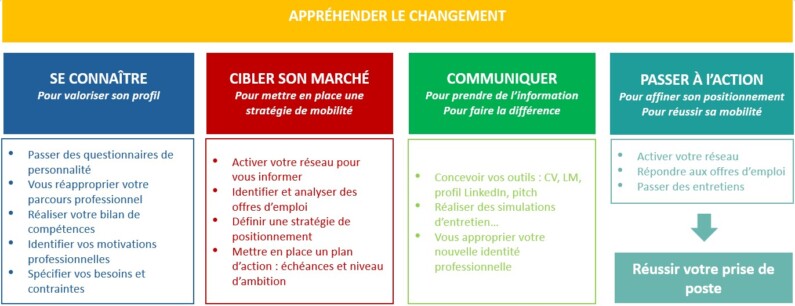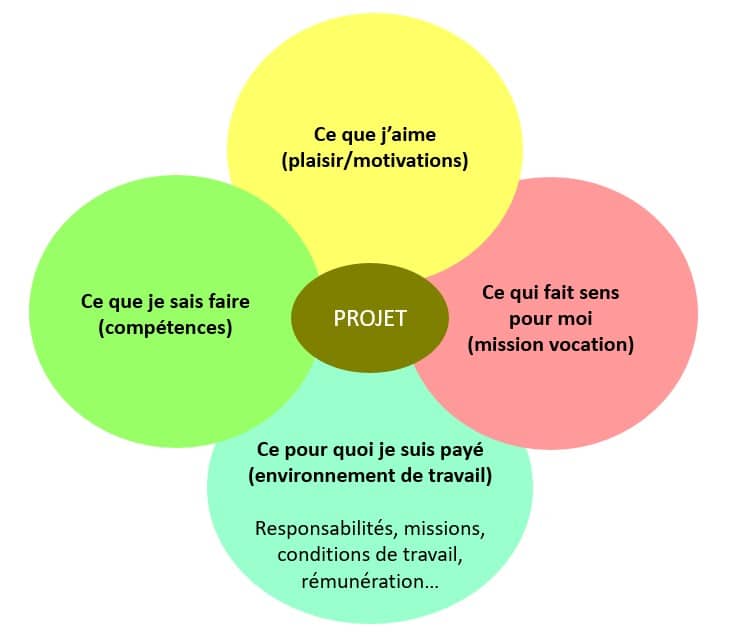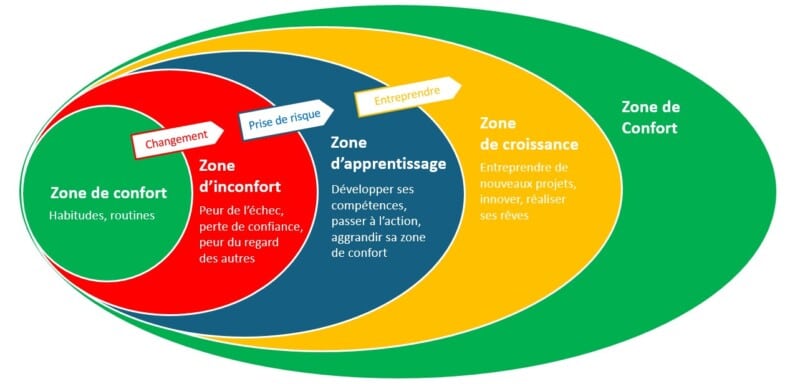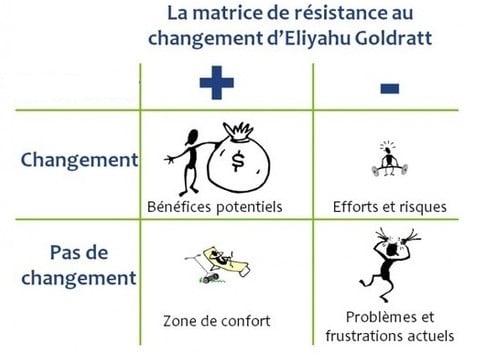The Conseil en évolution professionnelle (CEP) offers managers tailor-made support to help them anticipate changes in the market and seize new opportunities. Managers must constantly adapt to digital transformations, reorganisations and new leadership models that redefine expectations and skills in the workplace. They also need to be agile in order to optimise their technical expertise, interpersonal skills and leadership, and so remain effective in environments that are often competitive or under stress. But what exactly is career development advice? Where should you start? And how can you make the most of it to advance your career? Delphine Lopenague, coach, career consultant and trainer, provides the answers.

What is career development advice?
Career development advice is a free, personalised support scheme for anyone wishing to take stock of their career. It is aimed at employees, the self-employed and jobseekers to help them define and implement their career plans. The CEP enables people to analyse their skills, identify potential career paths and access appropriate training. It is provided by approved operators (France Travail, APEC, etc.). This confidential support helps to anticipate changes in the labour market and secure career paths. For example, it can be used for retraining or to upgrade skills. An adviser helps to structure the process and mobilise the available funding. Depending on the needs of the beneficiary, several hours of support are spread over a few weeks or months.
For managers, it's a key tool for boosting their careers and seizing new opportunities. Thanks to an in-depth analysis of their skills and aspirations, this system helps them to take a step back and define the key stages in their development.
Career development support takes many forms: coaching, skills assessment, mentoring and training. Many companies have also set up mobility programmes to help their employees make career transitions. For example, ALLIANZ offers 30 employees a year an internal mobility programme combining group workshops and individual support over 6 months.
Some figures - Robert Half study - November 2023
- 53 % of employees say they are actively seeking employment or looking for new opportunities
- 27 % are planning to change jobs in the next 6 months as part of a professional retraining programme
- 32 % want to change sector of activity
Reasons why French employees want to change company :
- Pay rise 55 %
- More responsibility 35 %
- Work/life balance 35 %
- The quest for meaning 24 %
Stages of professional development
Before implementing a strategy for change, it is essential to get to know yourself. This introspective work will help you to identify your assets, strengths and aspirations more clearly, so that you can build an effective career transition or reorientation strategy. Armed with the right personal communication tools, you can then take action and make it happen!

Career development advice: what tools are available?
Career development advice can be based on a number of tools.
Personality questionnaires
After several years' experience, it's essential to take stock of your strengths and identify your assets in a new market or new position. Various tools are used in individual coaching or training to help you get to know yourself better. Some of the most common are :
MBTI
This model identifies your behavioural and psychological preferences, such as the way you perceive the world, make decisions and interact with your environment.
[Training]
DISC
This test focuses on your external behaviours and helps to improve your communication in social and professional contexts.
[Training]
Process Com
This method focuses on communication and the management of interpersonal conflicts.
[Training]
[Testimonial]
Emma left a large insurance company for an HR position in a small advertising agency, an environment with very different social codes.
"The MBTI helped me to understand why the start-up culture, with its fun, relaxed atmosphere, direct communication and rapid decision-making, suits me better. As a result, I've identified my personal behavioural style, which enables me to communicate better with my teams and my manager. I've realised that it's time to assert what makes me different, rather than conforming to the expectations of others.
Skills assessment
A skills assessment is an invaluable tool for revisiting your career path. It enables you to take stock of the skills you have developed through your various experiences, both inside and outside the workplace, and to identify those that are transferable to your new project. You will also be able to identify those that you would like to develop, add or leave behind. This will give you a real "skills bank" that you can use to meet the needs and challenges of your next position.
There are three types of skills :
Knowledge (names) : knowledge, often linked to a level of expertise
Skills (action verbs) : professional skills that can be linked to a specific profession
People skills (qualifiers) : behavioural skills

You are competent when your knowledge (technical and of yourself) enables you to make the right choices and to deploy yourself in action with performance.
ORSYS training Taking stock and embarking on a new career plan allows you to take this work further.
[Testimonial]
Zara, with her experience in sales and purchasing administration, wants to become a key account manager.
"I updated my CV but my applications went unanswered. My adviser helped me to understand that I had to promote my skills rather than my previous jobs. I also realised that I had more skills than I thought. I realised that it's essential to highlight transferable skills to capture the attention of recruiters. In other words: leave the past behind and look to the future by proposing a new approach. offer of service to my next employer, not a career path.
A viable, long-term career plan must be based not only on your skills and personality, but also on your motivations and be meaningful.
Motivation in your career plan
Motivation is what drives you to accomplish tasks that you enjoy and that give you energy. It influences your choices and behaviour. According to the Sisem developed by Éric Mortier, we can identify six major sources of motivation :
- Exploring and understanding the world
- Building and controlling your environment for effective results
- Conquering through action, freely and without constraint
- Supporting others and working as a team
- Meeting, exchanging and learning from differences
- Design, innovation and aesthetic care
Unconsciously, your daily actions are designed to feed your three main motivators or sources of motivation. The idea, then, is to identify which ones and then identify the everyday activities that feed them. Remember that if they are not fed at work, you can feed them in your extra-professional activities.
What meaning should you give to your career plan?
The impact you want to have on the world will help guide your choice of missions and organisations. The latter will emphasise values and CSR commitments in particular. It's up to you to find the environment that will enable you to make your own contribution to the causes that inspire you.
[Testimonial]
Ali, formerly employed by an investment bank in Switzerland, had lost interest in his job. He realised that contributing to the growth of companies that were already profitable made no sense to him. He moved to Paris to develop investments in developing countries, particularly in Africa, in line with his origins.
"I get paid less, but I'm happy to contribute to a cause that's close to my heart.
The Ikigai model
The Japanese Ikigai model means "reason for being". An excellent tool for giving meaning to your career plan, it enables you tobuild your ideal project around 4 pillars. It then acts as a compass, enabling you to assess whether a job is right for you and what adjustments might be needed to bring you into line with your aspirations.
[Training]

Supporting professional change with career development advice
What kind of professional do you want to be tomorrow? Developing professionally sometimes means changing your personality. professional identity. The support of a coach can help you work on your posture and embody these changes in your behaviour.
[Testimonial]
The example of Eric, Financial Controller
Éric wanted to move up to the position of Chief Financial Officer (CFO) within his company. His application was rejected because in his current position he had not demonstrated strategic vision, communication skills or the ability to explain figures in simple terms.
"Internally, I'm seen as a specialised expert and I'm stuck in this image. Coaching helped me to bring out the personality traits and skills I needed to embody the role. role of CFO in a natural way so that I'm ready for my next external position. I couldn't have done this job on my own.
Career coaching can also help you overcome your obstacles to unlock your potential and gain confidence. By overcoming certain fears linked to the release of your comfort zoneyou can reach your learning and development zone and succeed in your development.

Make realistic choices and challenge your strategy
Once you have completed your assessment as part of your career development support, possibly supplemented by personal development training, you will be able to target your market. It is advisable to explore up to three career paths in parallel. But not more than that, as it requires a lot of energy and time to investigate simultaneously. This process includes making choices about your next responsibilities, sector, company, working conditions and salary. Your advisor will help you to define a short-, medium- and long-term strategy, as well as identifying any training courses or accreditation of prior learning you may need.
It will also help you to assess your risk-taking. You could be attracted by the advantages of a promising and exciting job without measuring the risks. Or, on the contrary, you could be held back by the fear of losing material comfort, which could prevent you from making decisions that are beneficial in the long term.
[Testimonial]
Émilie has left a well-paid job in IT at a major luxury house. She wants to move into the sports events sector. The first step was to get a foothold in the sports sector. So she became a floor manager at Decathlon, with a salary cut in half. To combine her passion and her profession, she was prepared to make efforts and sacrifices for two years. That's the time she needs to take full control of her job and to be able to develop internally, if she so wishes. This job is a springboard. It will enable her to gain experience in sales management, develop her network and get involved in sporting events.
Eliyahu Goldratt's matrix can help you assess the risks:

Best practices for taking action
- Studying your target market: It's essential to know what the market demands so that you can position yourself realistically.
- Activate your network : Networking allows you to gather information, raise your profile and strengthen your professional opportunities.
- Communicating effectively : The right CV, an attractive LinkedIn profile and a clear, concise pitch will help you stand out from the crowd.
- Interviewing and learning from mistakes: Every interview is an opportunity to learn and improve so that you're better prepared for the next opportunity.
In conclusion, managers must constantly adapt to changes in the market while making choices in line with their aspirations. A young manager will have to make his mark in a new organisation, another will have to take on new responsibilities, while a more experienced manager will have to adapt his activity to remain competitive. Career development advice helps you to become agile and competitive, and to manage your transitions effectively at any age and level of experience. Are you ready to take charge of your professional future and meet these challenges?





